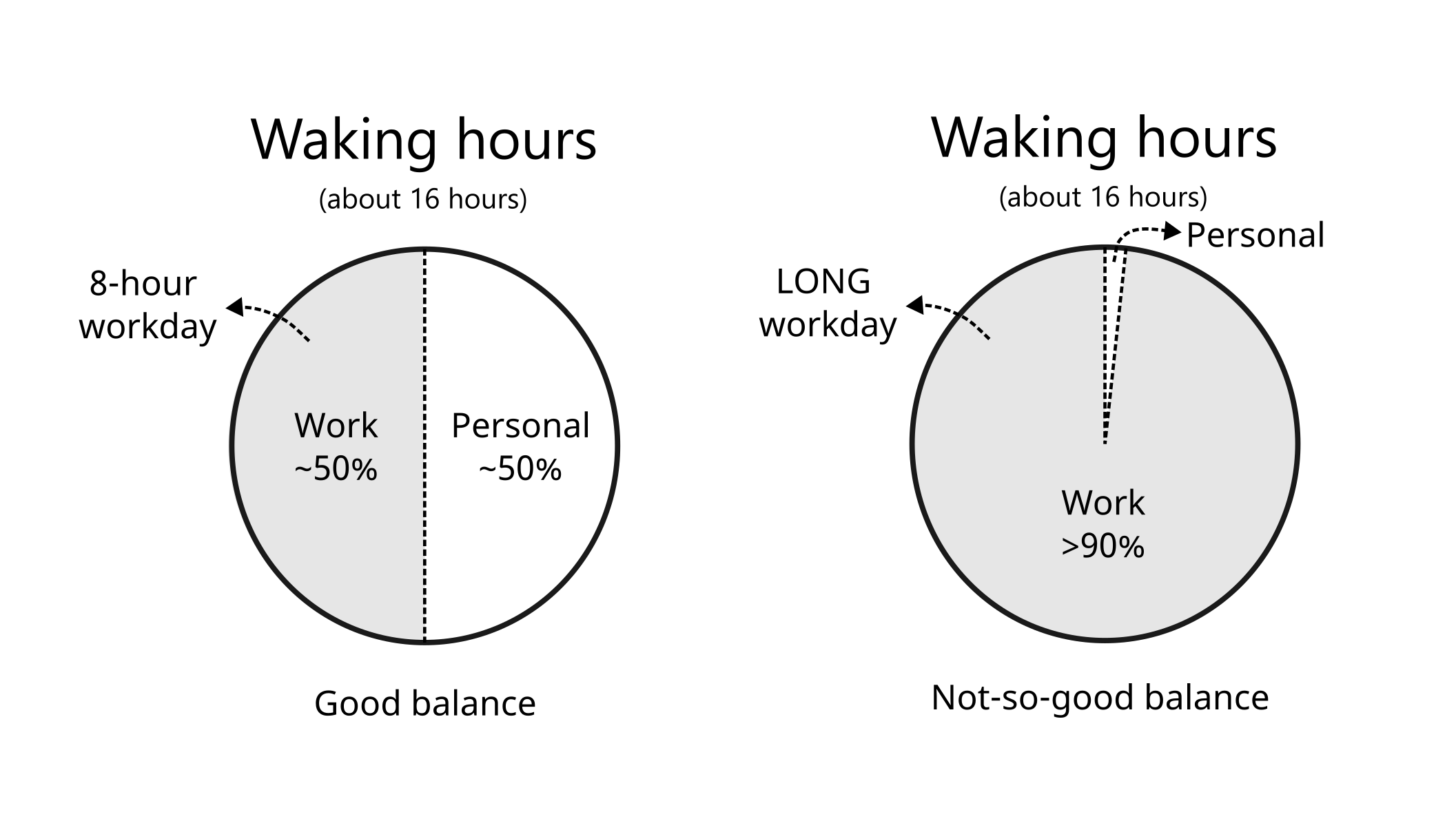3 Ways to Find Your Life-work Balance (in 5 Actions)

Welcome to the article that helps you reclaim the balance between your life and work! Too often, we get too attached to work and lose ourselves in the regular day-in and day-out.
In this blog post, I am sharing 3 ways to find your life-work balance to avoid stress and anxiety. (Note: Instead of work-life balance, I am placing life before work to emphasize the importance of life.)
1. Establish Boundaries at Work
Repeat after me, “Thank you for considering me for this project, but I won’t be able to take it on due to my current workload and commitments.”
Assume you have 8 hours of sleep. That means you have 16 hours left to be awake and functioning. Part of the 16 hours will be budgeted for work, i.e., the work time. What’s left is personal time, as shown in the figure below. The percentage balance between work and personal is a personal choice, but I believe we can agree that spending 90% of our waking hours working is not a good balance.

You need to say “No” to projects so you don't overwork yourself. My experience taught me that even though I could take on more work by stretching my limits, the toll on my personal time and well-being wasn't worth it.
Communicating openly about one’s current workload and commitments is critical in maintaining the life-work balance, your physical and mental health.
Read Tim's Boundary-setting Story
I will never forget when I took on too many projects and had to work outside my work hours. I was starting as a new hire and was afraid to say no because I feared it would reflect negatively on me.
Since I didn't have time during my work hours to finish the projects, I borrowed from my personal time. After two or three days of working till 9 pm, I finished the projects with the quality I was happy with.
Although the projects were completed, for a few days, my sleep was impacted, and I wasn't as alert at work.
I am all for going above and beyond to achieve more, but remember not to stretch yourself too thin.
2. Create Life-Work Boundaries
Create a personal ritual that symbolizes the end of the work day for you
The line between work and personal life can get fuzzy in today's work landscape. Creating a workspace at home seemed practical, but the constant presence of work items-computer screens and work notebooks-can add an invisible weight of duty, impacting both your peace of mind and physical comfort.
By creating a personal ritual that symbolizes the workday's end, you are letting your brain know that it is time to transition from work time to personal relaxation time.
Read Tim's COVID Story
My company asked us to work from home like many others during COVID.
I set up a foldable table in the corner of the living room, placed the company-issued 24-inch monitor on the table, and connected my work computer to the docking station. Boom, my home office corner was ready.
At first, I would leave my computer on at all times. It was super convenient to wake up a little late, go to my office corner, and catch the morning meeting in my PJs while eating eggs benedict. Even when I was having lunch, the notification on the computer conveniently notified me when new emails had arrived.
Two weeks in, I started to feel like I had constant pressure on my shoulders, tension around my neck muscle, and this constant worry in the back of my head. As this constant pressure and worry started to affect my sleep, I started doing some investigation.
I noticed whenever I walked past my office corner, I had the urge to check my email to see if anybody needed anything from me.
Because the computer was on, I would check for emails even at 8 pm (I have colleagues in different time zones). Because the computer was on, my mind couldn’t switch from work mode to relax mode. Because the computer was on, an invisible weight was placed on my shoulder, affecting my mental and physical well-being.
Once I discovered my tendency, I created a ritual to end the work day.
- Turn off my computer
- Close the computer lid and
- Put the computer in my work bag
So that I deliver the end-of-work message to my mind.
My sleep improved after I implemented the rituals. I also became more refreshed when I turned on the computer the next day.
3. Develop a Healthy Relationship with Work
1. Tell yourself, "My job is just one part of who I am. It doesn't define me completely."
2. Look for activities that bring your joy other than work
3. Find your purpose and mission statement to guide you
We all need to maintain a balanced and sustainable relationship with our job. It is hard to live one’s life when work-related concerns pop up during non-working hours.
The previous two exercises help you define boundaries on how much work you do and when to transition from work to life. This exercise creates a mental distance between your self-identity and your work identity so that you will enjoy retirement in the future.
When you put 8 hours a day into work, it is easy to shape your identity based on what you do at work.
Imagine yourself in your 60s, retired. If you only think of yourself as your job, you might feel down after retiring, as work won't be there to give you purpose. There are documented cases of retirement depression [1].
Remember, work is just a part of life and doesn't solely define you.
Seek joy in activities beyond work, and let your purpose and personal mission light your path. These mental shifts pave the way for a fulfilling retirement, free from the retirement depression.
Conclusion
Discover the path to a more balanced and fulfilling life with these three essential strategies.
First, establish clear boundaries at work by confidently saying "no" to additional projects beyond your capacity. Next, create life-work boundaries by adopting a personal end-of-day ritual that signals the transition from work to personal time, liberating your mind from constant work-related pressures.
Finally, find a healthy detachment from work by recognizing that your identity extends beyond your job, seeking joy in diverse activities, and defining your purpose and mission statement.
Embrace these practices to ensure a retirement free from the grip of work-related identity and find lasting contentment. Subscribe to our blog for more insights on reclaiming your life-work balance.
References
[1] https://psychcentral.com/depression/retirement-depression#why-retirement-can-cause-depression
Action Item
- Use this phrase: “Thank you for considering me for this project, but I won’t be able to take it on due to my current workload and commitments.” when you don't want to take on more work
- Create a personal ritual that symbolizes the end of the work day for you
- Say this out loud: “Work is just a part of life. I am not defined solely by my job.”
- Look for activities that bring you joy other than work
- Find your purpose and mission statement to guide you






Comments ()